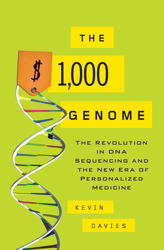
Taken individually, the letters A, G, T, and C seem relatively harmless. However, when arranged three billion strong into a human genetic code, these letters have instilled fear of discrimination, disease risk, and a genetically engineered super race of humans (Ã la the 1997 film “GATTACA”). Once only a subject for science fiction movies, whole genome sequencing is rapidly becoming a reality for the masses. So, what does this mean for you? In his book The $1,000 Genome, Kevin Davies does a commendable job of answering that question.
Dr. Davies introduces us to the people and technologies that have transformed genomic sequencing from a time-consuming and billion-dollar endeavor into what is bound to become a consumer product within the next few years. The $1,000 Genome serves as an excellent guide into the rapidly evolving world of personal genomics. Kevin Davies’ educational qualifications (M.A. in biochemistry and Ph.D. in molecular genetics) combined with his professional experience (founding editor of the world’s leading genetics journal, Nature Genetics, and author of Cracking the Genome) provide him with a depth of knowledge about the subject matter, the industry, and the people involved in the personal genomics revolution. Extensive interviews with many of the top scientists and industry leaders infuse a refreshingly human element into the story about the race to the $1,000 genome.
Although the entire book is a worthy read, I highly recommend the first and last few chapters that focus on what Davies’ terms the “personal genomics pioneers” or “23 et al.”. This recommendation stems in part from my own preference towards the application of personal genomics services rather than the sequencing technology (detailed in the middle chapters) as well as from an admittedly biased interest in the history of 23andMe. The 23andMe community might enjoy learning — as I did — about the co-founders’ visions for the company and the contributions by some of the early team members (one of whom is described by Davies as having “an uncanny resemblance to Ashton Kutcher”). Furthermore, for anyone who finds the various arguments surrounding an individual’s right to access his or her DNA a bit overwhelming, the latter chapters provide an expert’s perspective on the pros and cons of “genomic democratization” in the realm of health care and government institutions. Although Davies generally appears to be a proponent of consumer genomics, he also provides examples of the possible risks of widespread DNA testing in addition to the benefits.
While reading this book, I found strong parallels between Davies’ general themes and 23andMe’s overall philosophy. Both Davies and 23andMe stress the importance of “empowering the individual” and “democratizing genetics”. Direct-to-consumer genetic testing puts the power of knowledge into the hands of the individual, in contrast to what is often deemed the paternalistic nature of the medical establishment. In a sense, 23 et al. are to the health care industry what the Internet was to communication and commerce–both services circumvent a historically closed and hierarchical structure by enabling anyone at anytime at any place to contribute to and access information.
In addition, Davies highlights how a greater understanding of disease risk may result in an improved emphasis on preventative care rather than treatment. He states, “Lee Hood, who invented automated DNA sequencing in the 1980s, espouses a vision in which medicine will–indeed, must–change from its current reactive mode, in which doctors treat already sick patients, to a more rational, preventative philosophy of maintaining wellness.” Our goal at 23andMe is to help you take a more active role in your health by knowing your disease risk and working with your physician to make lifestyle changes accordingly. Research efforts at 23andMe aim to understand the causes underlying many complex diseases in order to improve preventative measures and treatments in the future.
Overall, The $1,000 Genome champions the innovation and progress that is possible with a multidisciplinary approach to health care. Davies goes beyond a simple informative discussion about the direct-to-consumer genetic testing industry to provide a glimpse into the ingenuity and passion of the people who are driving the change. This book will be an interesting read to all 23andMe customers who are eager to learn more about the personal genomics revolution that they have chosen to join. As Davies hints in his book, the journey has just begun!


